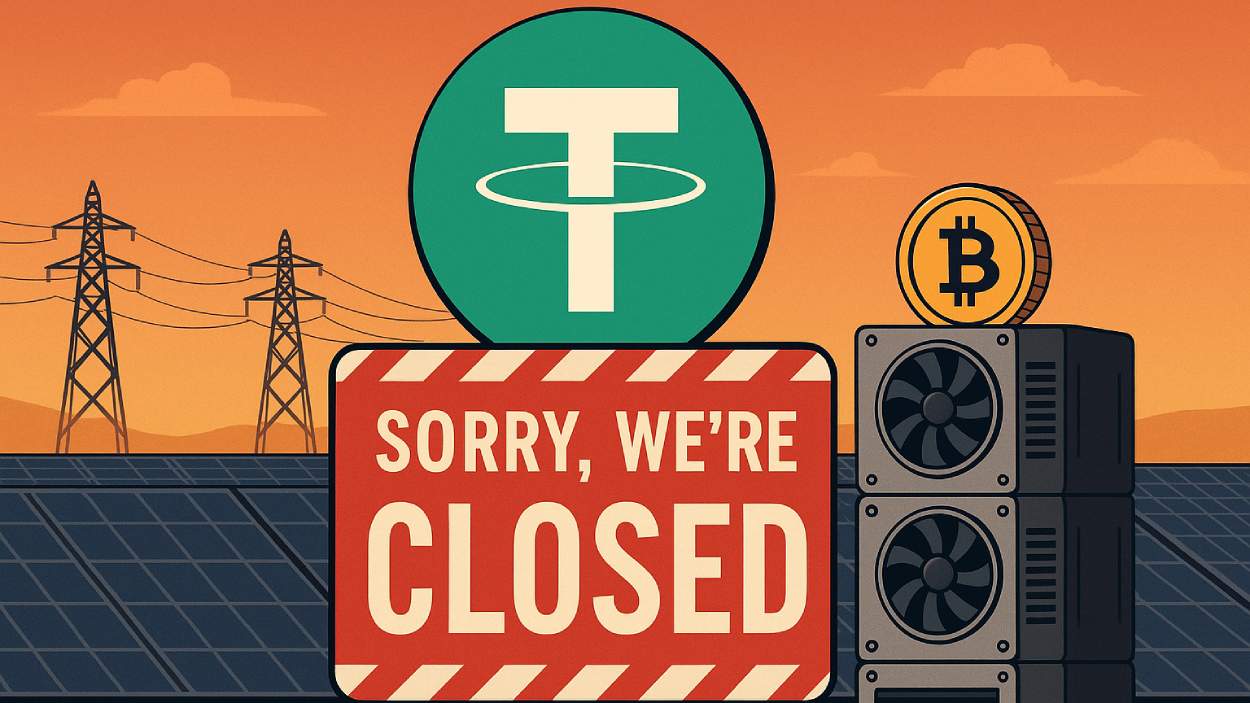Global crypto firm Tether is pulling out of its ambitious mining project in Uruguay, blaming steep energy costs and failed negotiations over electricity tariffs for the sudden retreat.
Quick Summary – TLDR:
- Tether has shut down its Bitcoin mining operations in Uruguay, laying off 30 of 38 employees.
- The company had pledged a $500 million investment but only deployed $100 million before halting.
- Skyrocketing electricity costs and tariff disputes with UTE made operations financially unsustainable.
- Tether is still exploring options for smaller-scale projects and potential reentry into Uruguay.
What Happened?
Tether, the company behind the world’s most traded stablecoin, has officially ceased its Bitcoin mining operations in Uruguay after months of back-and-forth with state utility UTE over energy pricing. The decision led to the termination of 30 employees and the abrupt halt of a once-promising $500 million investment plan launched just over a year ago.
According to El Observador, Tether has informed Uruguay’s labor ministry that it will halt local operations and lay off 30 staff, citing high energy costs and the lack of a competitive tariff framework. The company had planned a $500 million investment but completed just over…
— Wu Blockchain (@WuBlockchain) November 27, 2025
Tether’s Big Plans Derailed by Energy Prices
When Tether entered Uruguay in May 2023, it promised a large-scale infrastructure development that included three data processing centers in Florida and Tacuarembó, and a renewable energy park with a 300 megawatt capacity. About $100 million was spent building out this vision, with another $50 million earmarked for infrastructure meant to be owned by the national electricity grid.
However, high operating costs stemming from electricity rates ranging between $60 to $180 per megawatt-hour and additional fees such as 31.5 kV tolls made the project unsustainable. Tether proposed switching to a more cost-effective 150 kV toll structure and sought to revise its power purchase agreement, but no deal was reached.
Tether said, “Predictable and competitive electricity tariffs are essential for a project of this scale,” reinforcing how crucial energy affordability is for crypto mining success.
Power Cuts and Unpaid Bills Stir Controversy
By mid-2024, Tether’s local partner began defaulting on payments, eventually leading UTE to cut off electricity to two mining sites due to unpaid bills totaling around $4.8 million. Reports from local outlets revealed $2 million in overdue payments for May alone, with an additional $2.8 million stemming from other obligations.
Despite these figures, Tether denied the shutdown was purely due to debt, arguing instead that contractual uncertainties and energy costs were the driving issues.
Layoffs and Ministry Notification
The mining exit was made official during a meeting with Uruguay’s National Directorate of Labor (Dinatra) on November 25. Tether confirmed it had laid off 30 of its 38 employees in Uruguay, retaining only a small team to manage the wind-down process.
The move sparked wider debate within Uruguay’s energy and tech sectors about the feasibility of supporting energy-intensive industries like crypto mining under current regulatory frameworks.
Tether’s Future in South America
While operations in Uruguay are winding down, Tether is not abandoning Latin America altogether. The company has moved its global headquarters to El Salvador, drawn by the country’s crypto-friendly stance. It also signed a new deal with Adecoagro for a mining venture in Brazil, focused on renewable energy.
Additionally, Tether has acquired Parfin, a digital asset custody firm in Latin America, signaling ongoing interest in blockchain infrastructure across the region.
Still, Tether has publicly left the door open for a potential return to Uruguay, with executives stating they are exploring new ways to participate in the country’s tech and energy sectors, possibly through smaller-scale pilot projects or future partnerships with local providers.
SQ Magazine Takeaway
Honestly, this is one of those classic cases where ambition clashed with reality. I think Tether underestimated the complexity of local energy markets and overestimated their ability to negotiate better terms. The tech was ready, the money was there, but the math just didn’t work out. For anyone in crypto mining, this is a wake-up call about how essential affordable and predictable electricity really is. Uruguay looked like a perfect fit on paper, but the fine print in the energy bills told a different story.


































































